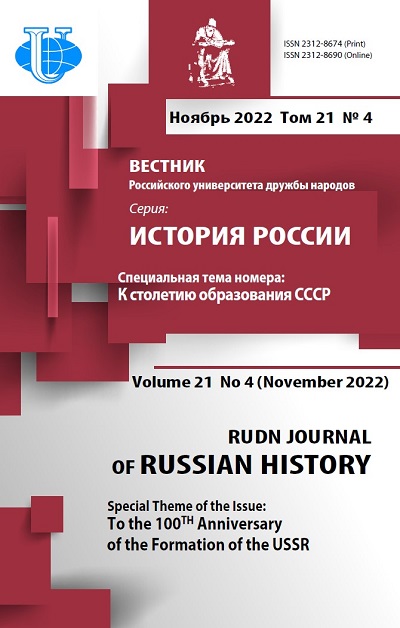Russian Exporters to Iran vs Transcaucasian Transit of European Goods in the Early 1880s
- Autores: Kornoukhova G.G.1
-
Afiliações:
- Peoples’ Friendship University of Russia (RUDN University)
- Edição: Volume 21, Nº 4 (2022): To the 100th Anniversary of the Formation of the USSR
- Páginas: 556-567
- Seção: ARTICLES
- URL: https://journal-vniispk.ru/2312-8674/article/view/321975
- DOI: https://doi.org/10.22363/2312-8674-2022-21-4-556-567
- ID: 321975
Citar
Resumo
The problem of European goods transit from the Black Sea ports of Russia through Transcaucasia to the northern markets of Persia in the 19th century is considered. The author analyzes the history of its functioning, pays special attention to the process of Russian bureaucracy’s discussion of the issue of the expediency of preserving the Transcaucasian transit which was finally closed in 1883. The historiographic analysis reveals that the problem of the role of Russian entrepreneurs in the abolition of duty-free transportation of European goods through Transcaucasia to Iran has not yet been covered properly. The author discloses the position of entrepreneurs on the issue under consideration through the analysis of materials stored in the fund of the Moscow Exchange Committee of the Central State Archives of Moscow; there are considered the arguments in favor of abolishing the transit expressed by the entrepreneurs associated with export to Iran in the early 1880s; there are revealed the Russian entrepreneurs’ appeals to the government. The author comes to the conclusion that in the circles of the highest bureaucracy there was no unified position on this issue, which was due to the differences in the assessment of the role of commercial cargo from Europe to Iran for the development of the Russian economy. Whereas some officials, as well as representatives of the commercial and industrial circles, considered the preservation of transit to be an obstacle to the sale of their own products, for another part of the state bureaucracy it was a fiscal source of replenishment of the treasury. As a result, the pressure on the part of the commercial and industrial circles involved in the export trade with Iran led to the abolition of duty-free transit for European goods.
Sobre autores
Gadilya Kornoukhova
Peoples’ Friendship University of Russia (RUDN University)
Autor responsável pela correspondência
Email: kornoukhova-gg@rudn.ru
ORCID ID: 0000-0002-7553-1856
PhD in History, Ass. Professor of the Russian History Department
6, Miklukho-Maklaya Str., Moscow, 117198, RussiaBibliografia
- Ataev, Kh.A. Torgovo-ekonomicheskie sviazi Irana s Rossiei v XVIII-XIX vv. Moscow: Nauka. Glavnaia redaktsiia vostochnoi literatury Publ., 1991 (in Russian).
- Bobynin, N.N. Persiia, ee ekonomicheskoe polozhenie i vneshniaia torgovlia 1901-1923. Tiflis: Tipografiia Voennogo Komissariata Publ., 1923 (in Russian).
- Kukanova, N.G. Ocherki po istorii russko-iranskikh torgovykh otnoshenii v VII - pervoi polovine XIX veka (po materialam russkikh arkhivov). Saransk: Mordovskoe knizhnoe izdatel'stvo Publ., 1977 (in Russian).
- Kukanova, N.G. Torgovo-ekonomicheskie otnosheniia Rossii i Irana v period pozdnego feodalizma. Saransk: Izd-vo Mordovskogo universiteta Publ., 1993 (in Russian).
- Kulagina, L.M. “Torgovo-Ekonomicheskie sviazi Rossii i Irana (XIX - nachalo XX vv.).” Iran. Istoriia, ekonomika, kul'tura. Pamyati S.M. Alieva, 118-140. Moscow: IV RAN Publ., 2009 (in Russian).
- Kupriyanova, L.V. “Morozovy i Obshchestvo dlia sodeystviia russkoi promyshlennosti i torgovle.” Morozovskie chteniia. 1996 g., Accessed October 28, 2021, https://www.bogorodsk-noginsk.ru/arhiv/chteniya96/index.html (in Russian).
- Lobko, P.L. Vsepoddaniishii otchet Gosudarstvennogo kontrolera. St. Petersburg: [S.n.], 1901 (in Russian).
- Morozova, T.L. “On the history of the abolition of the Transcaucasian transit.” History of the USSR, no. 3 (1977): 3 128-140 (in Russian).
- Nebol'sin, G.P. Statisticheskie zapiski o vneshnei torgovle Rossii. St. Petersburg: [S.n.], 1835 (in Russian).
- Nikonov, O.A. Politika Rossiiskoi Imperii na Srednem Vostoke vo vtoroi polovine XIX v. Moscow: Prometei Publ., 2015 (in Russian).
- Palashkovskii, S.E. Zakavkazskii tranzit v Persiiu. St. Petersburg: tip. t-va Obshchestv. Pol'za Publ., 1876 (in Russian).
- Polovtsev, A.A. Dnevnik Gosudarstvennogo sekretaria. Moscow: Tsentrpoligraf Publ., 2005. Vol. 1 (in Russian).
- Pyzhikov, A.V. Grani russkogo raskola: tainaia rol' staroobriadchestva ot 17 veka do 17 goda. Moscow: Conceptual Publ., 2018 (in Russian).
- Shavrov, N.A. Russkii put' v Zakavkaz'e. St. Petersburg: tip. A.S. Suvorina Publ., 1883 (in Russian).
- Shuster, U.A. “Ekonomicheskaia bor'ba Moskvy s Lodz'iu (iz istorii russko-pol'skikh ekonomicheskikh otnoshenii v 80-kh godakh proshlogo veka).” Istoricheskie zapiski, no. 5 (1939): 188-245 (in Russian).
- Slavkina, M. V. Rossiiskaia dobycha. Moscow: Rodina MEDIA Publ., 2014 (in Russian).
- Stepanov, V.L. M.N. “Katkov o problemakh tamozhennoy politiki v Rossii: fritrederstvo ili protektsionizm? (1860-1880-ye gg.).” Voprosy teoreticheskoy ekonomiki, no. 3 (2020): 116-129 (in Russian).
- Tikhotskii, E.A. Zakavkazskii tranzit i nasha s nim konkurentsiia po torgovle s Persiei v 1862-81 gg. Kiev: S.V. Kul'zhenko Publ., 1883 (in Russian).
Arquivos suplementares









